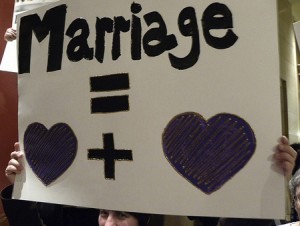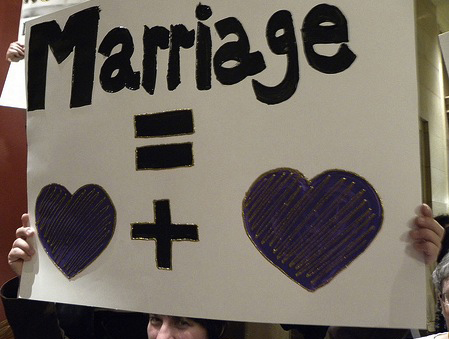Follow more from Robyn here –> Gay Girl Revolution
Is love the basis for every marriage? Is that why Ireland’s deputy head of government, Eamon Gilmore, in support of marriage equality, publicly announced that he did not think it was the job of the state to “determine who people should fall in love with, or who they should spend their lives with”?
The reality of the matter is that people choose to get married for many different reasons. And these reasons are one’s own, be it for love, legal, financial, spiritual, religious reasons, a combination, or some other reason entirely. To my mind, I believe marriage is about love. But that’s the way I see it. It’s not necessarily the way everybody sees it.
We know that marriage is a legal relationship that brings with it rights and responsibilities. We know it is a (potentially) life-long, exclusive commitment, but after that, surely it must mean different things to different people. This is the point. As it stands, the state dictates who I can marry, on the basis of gender, but the state will never dictate why I marry. These choices and these decisions are aligned to my autonomy, my liberty, and my freedom as an equal citizen of this country. Who is to say what marriage means to anybody else?
As a bar to equality, some opponents argue that the sole purpose of marriage represents the basis for procreation. Equality will never be defeated by such suggestion. It is a most demeaning argument. Those that suffer the backlash of this kind of prejudice, are not only couples who comprise the same gender, but also married couples who do not reproduce their own children, together with married couples that do not want to have children. The advocates of this “procreation argument” must necessarily hold the proposition that these marriages are of some type of substandard status. After all, these marriages are not fulfilling the sole purpose of the institution as they see it. It is an argument that carries with it offensive disregard for many people.
To make a point about procreation, here’s the thing. Some people may very well see their marriages as the basis for procreation. And that’s fine. Why? Because they are entitled to see their own marriages that way. We don’t have to agree on the purpose marriage serves for everybody. None of us has any say in why someone else gets married. What they intend to get from it, what they intend to put into it, is a private matter. What purpose marriage serves in their own lives, as they want to live them is for them to decide. They make their vows to each other, not to any other. In fact, I would even go as far as to say that such aligned intentions of two individuals to a marriage, is a good thing. They share the same outlook. Their views align together. This “meeting of the minds,” a consensus ad idem, is something that incidentally is a prerequisite for all contractual relationships, and marriage is a contractual relationship. People are entitled to see their own marriage as a basis for procreation. They are not entitled to attempt to compel anybody else to see marriage that way, or attempt to obstruct justice on the basis of their views. This is the point; procreation may be an implicit or express wish between the parties to their own marriage, but it is not an implicit, nor an express requirement of marriage as an institution.
To my mind, a most realistic, and sensible statement about marriage came from the judgment of Marshall C.J. in Goodridge v. Massachusetts (the case that secured the equal right to marry in that state).
Marshall C.J. stated that:
“Our laws of civil marriage do not privilege procreative heterosexual intercourse between married people above every other form of adult intimacy and every other means of creating a family… Fertility is not a condition of marriage, nor is it grounds for divorce. People who have never consummated their marriage, and never plan to, may be and stay married … People who cannot stir from their deathbed may marry … it is the exclusive and permanent commitment of the marriage partners to one another, not the begetting of children that is thesine qua non of civil marriage.”
At the end of the day, there is no necessity and no requirement that we, as a society, be uniform in our opinion as to what marriage means to us as individuals and as couples and whether it includes children, or whether it does not. No uniformity is required relating to what we want from it or what we want to put into it. And this will never be the case. It is essential however, that there is uniformity in the law of our state and its treatment of all individuals and indeed of all couples. Our equal citizenship is by way of guarantee, which grants us equal entitlement with full and equal access to enjoy all the benefits of our society. The institution of marriage is seen as one of these benefits and it is the duty of the state to facilitate and enforce that guarantee.
As we move toward equality in marriage laws, it is important that we move away from these elements of tradition that purport to divide us, that interfere with fairness, and that are not necessary. It is clear, marriage is something held high in value and close to heart by most. What’s love got to do with it? It would seem very much. What’s gender got to do with it? It would seem very little. In fact, the only role that one’s gender plays is that it currently operates to deny the opportunity of marriage. Of concern to us all is a reality of justice. Of concern to us all is that the autonomy, the liberty, and the freedom of every individual in our country is upheld. To be fair, the gender of the person I want to marry will concern only me. And our marriage will concern only us.
_______________________________________________________________________________________________________
The Meaning of Marriage: In Pursuit of Justice,



